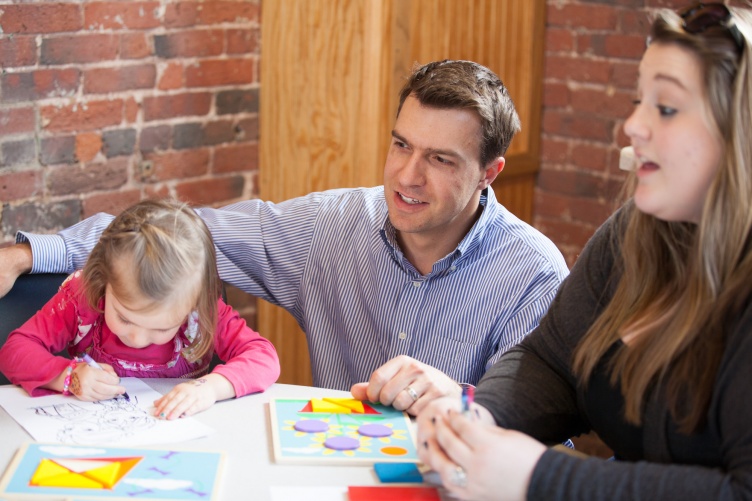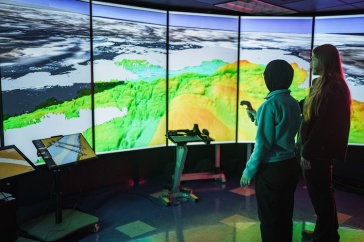
Pediatricians see children with ear infections or injuries pretty often. But when a child has a problem that isn’t physical, it may be harder for the doctor to know what to look for.
Nicholas Mian, assistant professor of psychology at UNH Manchester, is aiming to change that. As part of a grant-funded project, Mian has developed a video-based training program for pediatric residents to help them identify childhood anxiety disorders. Mian recently launched the program at the Floating Hospital/Tufts University pediatric training program in Boston.
“Pediatric residents have very little opportunity to learn about mental health disorders, especially their early manifestations and how they can be identified and treated,” said Ellen Perrin, director of research at the Center for Children with Special Needs and professor of developmental-behavioral pediatrics at Tufts University School of Medicine. “This project makes available to the residents this kind of information in a way that fits in with the time demands of their training program.”
Mian, who teaches courses related to clinical and child psychology at UNH Manchester, has focused much of his research over the years on understanding anxiety in young children, and how this knowledge can inform the design and implementation of early intervention and prevention programs. In addition to teaching and research, Mian is a licensed clinical psychologist specializing in the treatment of child anxiety.
Mian said that through his research, he discovered that child psychologists are not particularly good at passing their knowledge and expertise in evaluating and treating emotional disorders onto what he calls “gateway providers.”
“For example, as a child psychologist, I only really get a chance to interact with a family when they come into my office," Mian said. "But pediatricians have a chance to meet with a family before a problem has been identified, so they have this kind of unique opportunity to be a sort of gateway into mental health services.”
The problem, Mian said, is that pediatricians often lack the training to know the difference between a typical level versus a clinical level of anxiety, and when someone should be referred. He said this is because pediatric training programs include very little on children’s mental health disorders.
“The training they do get is usually focused on autism, ADHD or psychosis, like schizophrenia,” Mian said. “But when it comes to emotional disorders like anxiety and childhood depression, there is very little training in this area.”
The reason why that’s important, he said, is because these disorders are often a sign of emotional trouble down the road.
“When you identify a child, even a preschool-aged child, who has severe anxiety, that’s a significant risk factor that they are going to have difficulties with emotional problems down the road,” Mian said. “So the idea is if we can get them into the clinic early, we can provide them with treatment that will have lasting effects.”
Mian and the team at the Center for Anxiety and Related Disorders at Boston University, where Mian is a research associate, figured they were in a great position to create something that filled in those gaps for pediatricians. With funding from the Deborah Monroe Noonan Memorial Research Fund and in collaboration with Tufts School of Medicine and Boston University School of Medicine, they set out to do just that and came up with the training program.
Mian said the first part of the program teaches the residents what anxiety in children is and what it looks like at different developmental stages. Additional modules teach residents how to differentiate between normal levels of anxiety and clinical levels, and then how to talk to parents about the problem and ways to treat it.
Mian says this issue is becoming increasingly important as a push for mandatory behavioral health screening for children makes its way across the country. The training itself is a standalone series of web videos. Currently, Mian said, the residents watch the videos and then Mian discusses the material with them in a group format.
“We’re basically going to use the data we collect from this pilot program to figure out if this thing is effective and how it can be improved,” Mian said. “If we find that this is effective, because of the web format, we can easily disseminate it to other programs. We’ll take it on the road.”
Mian said future plans include expanding to residency programs and/or pediatric practices in New Hampshire, so students would have the opportunity to get involved with the delivery of the training itself.
Why is early intervention important for child anxiety? Hear answers from Mian and other experts in the trailer video for the program.
UNH Manchester offers the career-driven programs, faculty talent and student-centered community to shape your future.
Learn more today
-
Written By:
Kassidy Taylor | Marketing & Communications, UNH Manchester | kassidy.taylor@unh.edu
















































